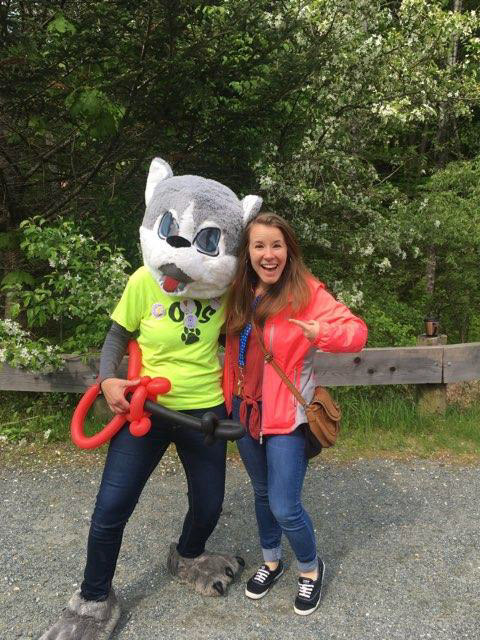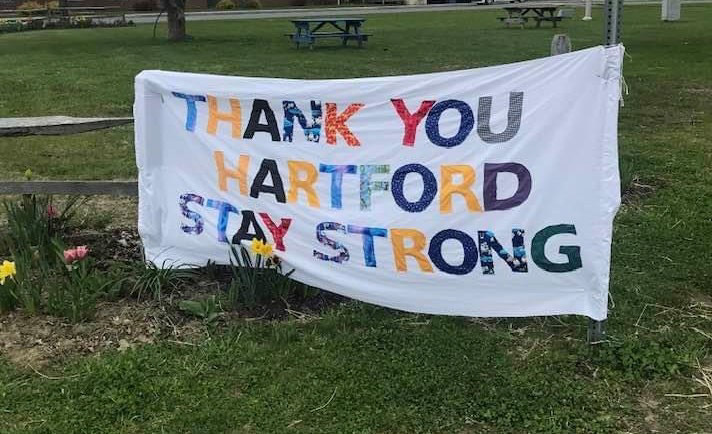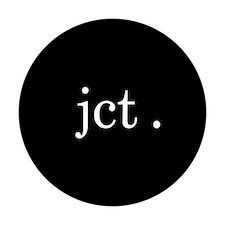By Isaac Lorton
According to Miss Wetzel, kindergarten is tough enough as it is. For the students: so many new ideas and experiences and lessons. So many new friends. So. Much. Learning. For the parents: letting go of your child’s education, even just a bit, is hard, and then trusting that the district and the schools and the teachers in your area will be the best educators for your child. And for the teachers: realising that you are most likely these young scholars’ first formal teacher and that you hold the responsibility of establishing a love for learning in the students that will hopefully carry them through the next dozen or so years. It’s tough. And this was pre-COVID.
Erika Wetzel, a kindergarten teacher at the Ottauquechee School in Vermont, has spent the last five years dedicated to creating a positive learning environment for the “kiddos,” as she refers to them. And for the past few months, she has continued to hopefully instill curiosity in her 13-person class as distance learning became the new norm for these first-time students.
“A lot of things I love about teaching have changed now because I can’t be in the same space as them and we can’t really be all together, experiencing school together in the normal sense that we would have done it usually,” Wetzel said.

Erika Wetzel with Ottauquechee Wolf Mascot. Photo Courtesy of Erika Wetzel.

Photo Courtesy of Erika Wetzel.
Distance learning quickly became a lot about “flexibility” Wetzel said, depending on the parents’ schedules or a student’s access to the internet or to the family computer.
“Not every family is going to have a similar routine or rhythm at home because everybody is doing different things, whether it be they’re working and their child is in daycare all day or they are able to be home with them,” Wetzel said. “I feel like what we’re trying to do with distance learning is maintain connections with the kids, but it’s been challenging. It’s been so so different that I miss being at school with them a lot because it doesn’t feel the same.”
As the first wave of the covid-19 pandemic hit, kindergarten teachers had to abruptly transition an in-person classroom into an online classroom, while still fostering social-emotional learning.
“It is their first year of doing all-day school, and having not done a year previously, they’ve got lots of questions and lots of confusion about like, ‘Is this what the end of the year will always look like? Or, ‘Why are we suddenly not doing normal school?’” Wetzel said. “And I’m sure their parents talked to them about the pandemic and why we’re having to do this, but I’m sure that it’s confusing, especially because they’re not able to be with their friends right now. The social-emotional piece of kindergarten is so important, and they’re not able to be with their friends to practice their social skills right now. That’s one of the trickiest parts about distance learning. And for them not being able to understand why they can’t be with their friends right now, I’m sure is very very hard. [The pandemic] probably will change the way that education is in the future.”
Teaching had shifted to sending out video lessons in the morning, hoping the parents and children were able to go over it, and answering questions as they came up.
“In the beginning [of distance learning], we would do writing lessons,” Wetzel said. “We would record ourselves doing basically what we would in the classroom — writing prompts, showing how we would say the word slowly and pick out sounds, and write the letters then to make the words and demonstrating how to do the writing prompts — so that when the parents are there with their child doing it, hopefully they can say, ‘Remember, Miss Wetzel put in finger spaces between her words’ or ‘We don’t need to spell the word totally correctly, we just need to listen for sounds and practice that.’
Wetzel and her co-kindergarten teacher realized this wasn’t the best way to meet the students where they were at, so they made changes. In May, Wetzel said, “We’re still learning how to navigate. I still feel like I am still trying to figure out how to teach during this time. It’s very challenging.”
“Initially the teachers were doing daily lessons, but that quickly shifted to holding daily meetings,” Wetzel said. “When distance learning first started — and I feel like it’s been changing slightly over time as we’ve been getting more used to the process and trying to figure out what’ll be best for the families — we started with giving specific activities each day for literacy and for math. We had given them a schedule that reflected what we did at school in case they wanted to do something similar at home and build their day similar to how we did it at school. We’ve shifted from giving specific instructions each day, to have it be more of choice-based, themed activities each week.
“So we make powerpoints for them now with details about each activity. We usually do literacy, math, and ‘get creative’ options. They get to choose each day from the list of activities to try, and we also say that they can do any of the other distance learning activities that we had done previously, and most of those are online. We have a reading website that they can go to to listen to or read stories. We found a math site that will let them practice counting skills and recognizing numbers on a website. We’ve also tried to think of options that are less online because we realize that kindergartners will rely on their families to do a lot of the online stuff because they’re less independent with that. So we wanted to make sure that there are a lot of options that they could do without needing the computer necessarily.”
For the daily meetings, Miss Wetzel still had story time (her favorite part of the day), and students learned how to mute themselves and to give everyone a chance to share. Not quite the same as sharing the crayons or sharing that book, but still learning how to give others a space to speak their mind.
“It’s hard, especially in kindergarten because everybody has a lot that they want to share,” Wetzel said. “We definitely got used to saying, ‘Make sure your mute button is on’ and ‘Let’s make sure we’re taking turns and raising our hands.’ It’s very different to have those meetings where the students are raising their hands, and you call on them, and they have to unmute themselves and speak.”
For things like show and tell, students were able to give tours of their homes, and introduce pets and siblings and family members. Different, yet teaching similar skills.
“There have been some funny times in our meetings, where we do scavenger hunts or just different things to get them moving and interested in the meetings that we have. It’s funny to see them move around and still get excited about participating.”
Substitute teacher Mr. Tanner. Photo Courtesy of Erika Wetzel.
There was even a substitute teacher early on in distance learning. Mr. Tanner replaced Miss Wetzel.
“We had dressed up as substitute teachers to play an April fools joke,” Wetzel said. “We filmed ourselves introducing the day and asking a morning question… as our substitute teachers and then we went to the meeting later in the day and some of the students had dressed up trying to fool us.”
In May, there was a parade. Teachers at all levels in the Hartford School District, decked out their cars and drove the bus routes to show support. Families in turn made signs for the teachers.
“It was our way to celebrate them and to say we miss you and say thank you for all of the hard work you are doing at home while you're away from the school building,” Wetzel said. “I always try to say that I miss them. Even at school, after a weekend, I would come back and say, ‘Oh friends, I missed you so much.’ And I remember one student looked at me and said, ‘We were only gone for like two days.’ I definitely let them know that they are missed. I also let them know, do what you can. I tell this to the families, too; do what you can, because everybody is dealing with this right now, and that’s all we can do. Do as much as we can to stay happy and healthy and connected.”
For “Step Up Day” — where kindergarteners meet their new first grade teacher and tour the classroom — teachers instead wrote letters to the families introducing themselves.
“These kids know that the next step is to go to the next grade and to go meet their new teacher,” Wetzel said. “They’ve never had to make a — I mean they had to make the transition from pre-school, if they went, to kindergarten — but I’m sure it will be challenging for them to move forward with having experienced all of this this year during their first full year of education. I can only imagine how confusing this is for them. And they’re just following what the adults are doing, and that’s all they can do: trust that we’re gonna lead them through this time.”
Granny Wetzel dancing for the talent show. Photo Courtesy of Erika Wetzel.
The school hosted an online talent show as part of their end-of-year pomp and circumstance. Students recorded their skills and the school put together a compilation video. The faculty closed the show with silly costumes and a dance mash-up. That’s what teachers do, Wetzel said.
Wetzel in pretzel glasses for end of the year assembly. Photo Courtesy of Erika Wetzel.
And of course, there was an end of the year assembly where students and parents and teachers alike were able to share their gratitude and well-wishes.
“I was super excited to see my students and to wish them well for the summer and tell them how much I appreciated everything they’ve done,” Wetzel said. “Sometimes the parents were able to hear that as well, which I wanted to make sure that they knew that we appreciated everything that they had done to support. Just a fun sendoff. But then kiddos would kind of just say goodbye and thank you and see you later and hopefully we’ll see you next year. That’s how we ended the meeting. It felt very bitter-sweet because we were able to see each other, but we’re not entirely sure what next year will look like.”
On June 4, Gov. Phil Scott announced that schools should prepare to be in-person in the fall.
“When the closing happened there was so much happening and so much to prepare and so much to think about that it felt long in the moment, but at the end of the school year I was thinking, how is it already June? It passed in a flash, but also so much happened that it felt so full."
On June 17, Governor Scott announced that preliminary guidelines had been created for reopening schools in the fall.
“It was a very unique year, and I feel like I’m still processing thoughts, while also thinking about next year and I think that’s more on my mind than anything else. Where will we be when we have school start up in the fall again?”
Though the first year of school for the kindergarten class of 2020 was weird and routines went awry, the joy of being a kindergarten teacher remains the same for Wetzel.
“I definitely enjoy spending time with the kiddos because I feel like, especially in kindergarten, they have this love for learning new things and this curiosity that is really inspiring and almost contagious because they’re just so happy to be there. They’re also learning — a lot. They’re learning how to deal with their emotions, and they’re learning how to be with one another and to express themselves in positive ways. I think it’s really cool to watch them kind of discover how to do that. And to just kind of be themselves in a way that is so innocent and so magical because I feel like they act so unapologetically because they’re just learning how to be.”
July, 2020
Isaac Lorton is thrilled to be writing, editing, and photographing in the Twin State region. Simply, Isaac is happy to be here in this place at this moment with this group of people.
